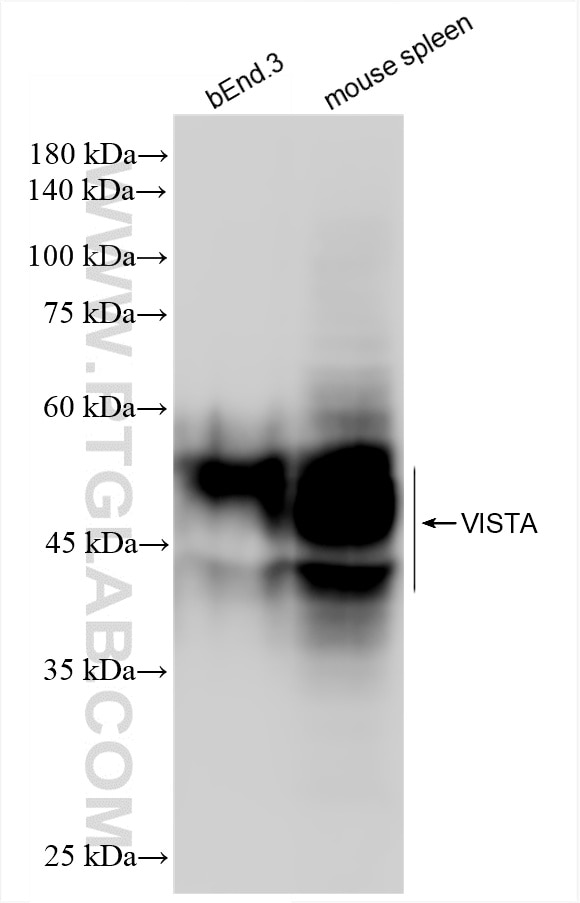VISTA Rekombinanter Antikörper
VISTA Rekombinant Antikörper für WB, ELISA
Wirt / Isotyp
Kaninchen / IgG
Getestete Reaktivität
Maus
Anwendung
WB, ELISA
Konjugation
Unkonjugiert
CloneNo.
250122E7
Kat-Nr. : 86114-3-RR
Synonyme
Geprüfte Anwendungen
| Erfolgreiche Detektion in WB | bEnd.3-Zellen, Mausmilzgewebe |
Empfohlene Verdünnung
| Anwendung | Verdünnung |
|---|---|
| Western Blot (WB) | WB : 1:2000-1:10000 |
| It is recommended that this reagent should be titrated in each testing system to obtain optimal results. | |
| Sample-dependent, check data in validation data gallery | |
Produktinformation
86114-3-RR bindet in WB, ELISA VISTA und zeigt Reaktivität mit Maus
| Getestete Reaktivität | Maus |
| Wirt / Isotyp | Kaninchen / IgG |
| Klonalität | Rekombinant |
| Typ | Antikörper |
| Immunogen | VISTA fusion protein Eg2809 |
| Vollständiger Name | RIKEN cDNA 4632428N05 gene |
| Berechnetes Molekulargewicht | 34 kDa |
| Beobachtetes Molekulargewicht | 40-55 kDa |
| GenBank-Zugangsnummer | NM_001159572.1 |
| Gene symbol | 4632428N05Rik |
| Gene ID (NCBI) | 74048 |
| Konjugation | Unkonjugiert |
| Form | Liquid |
| Reinigungsmethode | Protein-A-Reinigung |
| Lagerungspuffer | PBS with 0.02% sodium azide and 50% glycerol |
| Lagerungsbedingungen | Bei -20°C lagern. Nach dem Versand ein Jahr lang stabil Aliquotieren ist bei -20oC Lagerung nicht notwendig. 20ul Größen enthalten 0,1% BSA. |
Hintergrundinformationen
VISTA, also known as PD-1H, Dies1, and Gi24, is encoded by the Vsir gene in mice. VISTA is a type I transmembrane protein that acts as an immune-regulatory checkpoint on hematopoietic cells and shares homology with both the B7 family ligand PD-L1 and the CD28 family receptor PD-1. In mice, VISTA is expressed predominantly in hematopoietic tissues, such as the spleen, thymus, lymph node, and bone marrow (BM). VISTA plays a key role in regulating immune system responses and maintaining homeostasis.
Protokolle
| PRODUKTSPEZIFISCHE PROTOKOLLE | |
|---|---|
| WB protocol for VISTA antibody 86114-3-RR | Protokoll herunterladen |
| STANDARD-PROTOKOLLE | |
|---|---|
| Klicken Sie hier, um unsere Standardprotokolle anzuzeigen |


